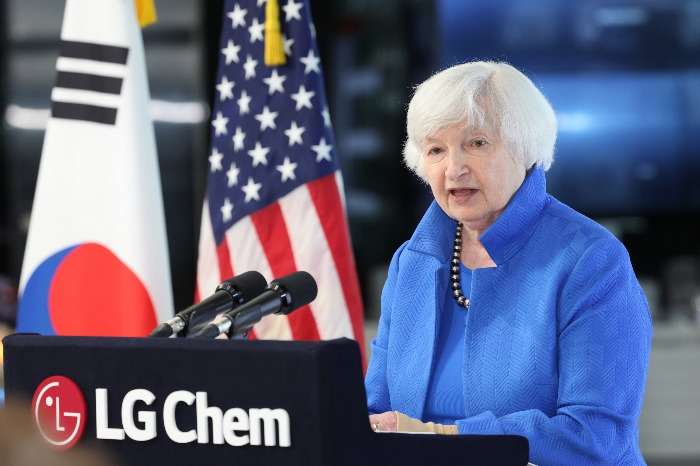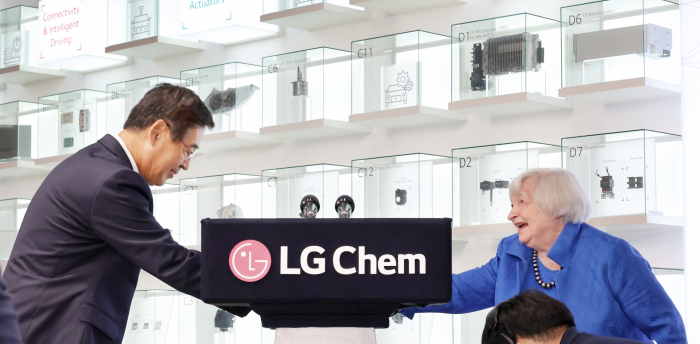Yellen calls for trade overhaul to diversify from China
Treasury Secretary Janet Yellen called for a reorientation of the world’s trading practices during a speech in South Korea
By The Wall Street Journal Jul 19, 2022 (Gmt+09:00)
LG Chem to sell water filter business to Glenwood PE for $692 million


Kyobo Life poised to buy Japan’s SBI Group-owned savings bank


KT&G eyes overseas M&A after rejecting activist fund's offer


StockX in merger talks with Naver’s online reseller Kream


Mirae Asset to be named Korea Post’s core real estate fund operator



SEOUL—Treasury Secretary Janet Yellen called for a reorientation of the world’s trading practices in the wake of Russia’s invasion of Ukraine, pushing again for countries to become less reliant on China for critical components like semiconductors.

“Friend-shoring is about deepening relationships and diversifying our supply chains with a greater number of trusted trading partners. The purpose is to lower risks for our economy and theirs,” she said.
South Korea, a longtime U.S. ally and the world’s 10th largest economy, is a critical partner in the Biden administration’s efforts to prevent China from dominating key technological industries like semiconductors and electric-vehicle batteries. Ms. Yellen is attending a series of meetings on Tuesday in Seoul—with President Yoon Suk-yeol as well as the country’s central-bank governor and deputy prime minister—in what marks the end of her first trip to Asia as treasury secretary.
In her remarks at the LG facility, Ms. Yellen specifically targeted China, accusing the country of using unfair trade practices to gain a dominant position in certain industries, including semiconductor production. She said purchasers should look beyond the sticker price to evaluate the geopolitical cost of buying from China.
“We cannot allow countries like China to use their market position in key raw materials, technologies, or products to disrupt our economy or exercise unwanted geopolitical leverage,” she said.
Russia’s leverage over global energy and food markets during its invasion of Ukraine has spurred a broader re-evaluation among Western countries and their trading partners. European governments fear that Moscow could soon completely shut much of Europe’s natural-gas flows in retaliation for the sanctions campaign the U.S. and its allies are waging on Russia. A sudden gas shut-off could tip European economies into a recession.
As governments and companies in the orbit of the U.S. and its allies forge ahead with trying to diversify their supply chains, some economists have cautioned that such a shift could damp the benefits of globalization and lead to higher prices. Ms. Yellen and the Biden administration are already grappling with the highest inflation in decades.
Ms. Yellen said the predictability of trading more with close partners could help prevent some price spikes. Under Mr. Yoon, a conservative who took office in May, South Korea has pledged deeper economic cooperation with the U.S.
“By working with key allies like Korea to develop stronger supply chains for key components like [electric-vehicle] batteries or semiconductors, we can make both of our economies stronger and help ease the blockages that have led to higher prices and delays for American workers and businesses,” she said.
Ms. Yellen has repeatedly criticized China’s economic behavior in recent remarks. Speaking in Brussels in May, she argued that the U.S. and European Union should confront China together about its trading behaviors and ensure that China doesn’t dominate the market for commodities like rare earths. She said last week that she would push China to show more flexibility in its role as a major creditor to many low- and middle-income countries.
At the same time, she is courting China’s cooperation in a proposal to place a cap on the price of Russian oil, raising the topic in a recent conversation with Chinese Vice Premier Liu He. Ms. Yellen has also advocated for the U.S. to relax at least some of its tariffs on Chinese imports as part of a continuing deliberation that has divided the Biden administration.
During their conversation, Mr. Liu told Ms. Yellen that he would appreciate the U.S. lifting the tariffs on Chinese imports, according to a senior Treasury official. Currently, the U.S. has tariffs on roughly $370 billion of Chinese goods.
While in Seoul, Ms. Yellen also met with female entrepreneurs and economists at the Bank of Korea, where she discussed her path to becoming a top economic official and the challenge of balancing her career with having a family.
Write to Andrew Duehren at andrew.duehren@wsj.com
-
 Business & PoliticsBiden and leaders of Japan and South Korea pledge greater cooperation
Business & PoliticsBiden and leaders of Japan and South Korea pledge greater cooperationJul 06, 2022 (Gmt+09:00)
4 Min read -
 Business & PoliticsYoon, Biden highlight 'economic security alliance' following Samsung tour
Business & PoliticsYoon, Biden highlight 'economic security alliance' following Samsung tourMay 20, 2022 (Gmt+09:00)
5 Min read


